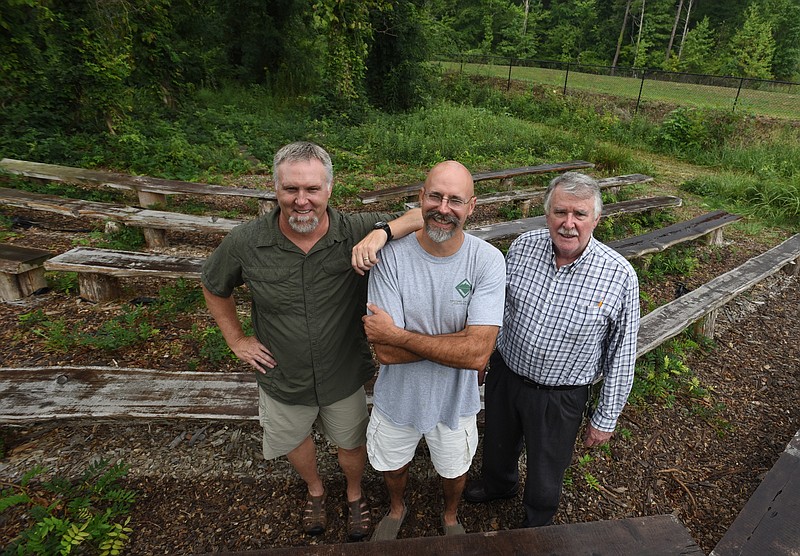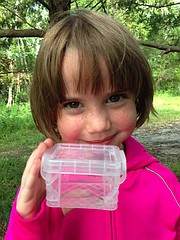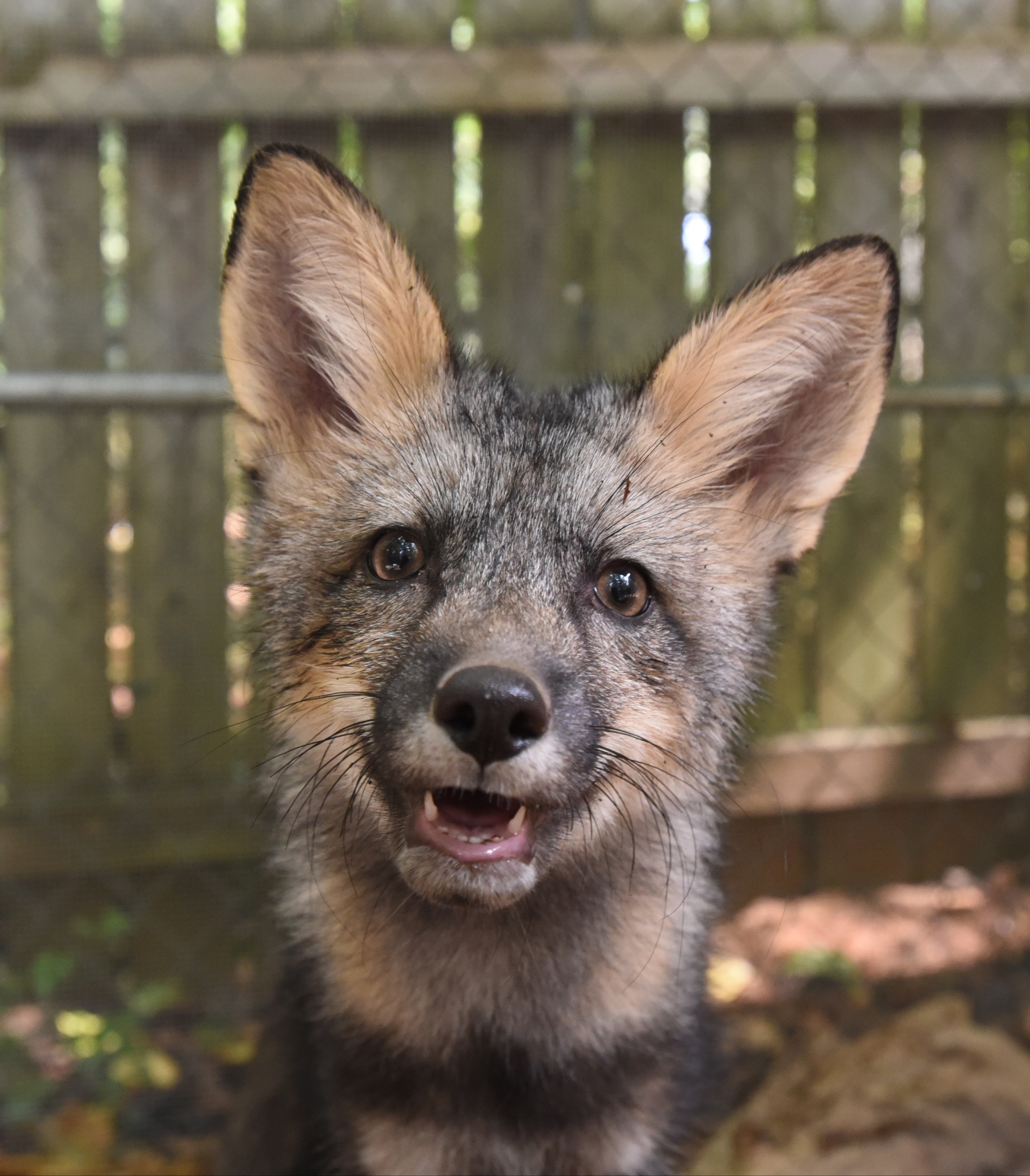There has been such a focus on testing and accountability that we've really lost sight of what a kid needs. Hopefully the pendulum is swinging back to what's in the child's best interest in developing the whole child.
Nature Center Ambassador
Reflection Riding Arboretum and Nature Center is known for its red wolf and coyote educational programs on its Lookout Valley campus. But the newest animal ambassador will visit schools, taking outdoor education indoors to the classroom.Todd is a red fox born in captivity in another state and brought to the Nature Center at five weeks of age. Since then the fox has been training with handler Tish Gailmard to visit classrooms and interact with the public. She and Todd will help children learn about a fox’s habitat, what it eats, how foxes live together in pairs or small groups of families, and its ability to adapt to new environments.“Exposure to folks of all ages, positive social interactions, leash and crate training are all part of his training,” says Gailmard. “Todd has been training with camps this summer and should be ready in late summer for the classroom.”To schedule a visit with Todd, call 821-1160.
The first day of school for a new kindergartner is always a momentous occasion for families, a milestone marked with photos and teary-eyed parents.
But for students in Samantha Eaton's kindergarten class at Red Bank Elementary School, Thursday's first day of class carries additional significance: They will be starting the first public school forest kindergarten in the state of Tennessee.
Forest kindergarten is play-based outdoor education that encourages creativity, imagination, exploration and inquisitiveness in children. Their classroom is the great outdoors. Rain or shine, cold temps or sweltering, children go outside every day and explore nature.
"Our day will be split with 2 1/2 hours inside, 2 1/2 outside," says Eaton. "Because we are lucky enough to have a large campus with a creek behind the school, we will take students to these spots and they will be allowed to lead where we go in the day. When kindergartners get out and naturally ask questions, we will integrate these questions into the curriculum and apply them to what we are studying."
Red Bank is one of several area schools incorporating outdoor education into its curriculum. Last fall, Gilbert Elementary School in LaFayette, Ga., founded the first public-school, forest kindergarten class in the nation. Silverdale Baptist Academy is launching a K-12 outdoor education component to its curriculum this year. And Wauhatchie School in Lookout Valley has had such demand for its second year of forest kindergarten that an additional class has been added for this fall.
Outdoor education is a term for organized learning that takes place outside, combining experiential learning with environmental education. Advocates say outdoor education builds respect for the land, fosters student self- esteem and informs students of cause-and-effect relationships. It allows children to pursue their interests instead of being told what to study and for how long. And, obviously, it promotes physical activity in fresh air for health.
Ivy Academy was the forerunner of outdoor education in Chattanooga. It opened in 2009, the first year of charter schools in Hamilton County. At that time, the state only allowed students who were either failing in their zoned school or who attended schools in the bottom 5 percent of state schools to attend charter schools. Laws have changed, however, and now any student in the county may attend a charter school. In 2013, Ivy Academy was the only public high school in Tennessee to be named a U.S. Department of Education Green Ribbon School.
Ansley Eichhorn, Ivy Academy environmental programming director, says the charter school now has grades six and seven, as well as grades nine through 12, with a student body of 200.
"We partner with the North Chickamauga Creek Conservancy to use land adjacent to our campus on the south bank of the creek as outdoor classrooms," Eichhorn says. "Our teachers are trained in citizen science, which is what the National Park system uses for data collection.
"We take our partnership very seriously and use it to collect data on flora and fauna and all types of inhabitants of the gorge. We monitor the biodiversity of salamander populations; we have a lichen plot. We also do phenology [the study of plant and animal life cycles and how they are influenced by climate variations]."
Eichhorn says tangible outcomes have been observed by faculty. The learning style has proven especially beneficial to students who don't fit the mold of traditional classroom learning, she says.
"I've seen students come to us who weren't successful in mainstream classrooms, but who found success here," she says.
Trent Walker, the first valedictorian of Ivy Academy in 2013, says attending the school shaped his career choice.
"I transferred from Lookout Valley Middle School. I tested gifted but got bored easily in my old school and wanted to move ahead," the 21-year-old says. "Being in a smaller school, more one-on-one time with teachers, gave me the chance to move ahead.
"Before coming to Ivy Academy I was interested in marine science; going to Ivy built my interest in forestry and fisheries. After graduating, I went to Coastal Carolina University to study marine science; now I'm enrolled in Cleveland State's wildlife, forestry and fishery management program to become a park ranger."
INTO THE WOODS
So why is outdoor education suddenly taking root in schools?
Local educators see it as an antithesis to "teaching to the test" - classroom hours spent preparing for standardized testing - and a way of reclaiming the joy of outdoor play that a tech-toy generation has lost.
"We have a generation raising a generation that never spent time outdoors," says Becky Hansard, headmaster of Silverdale Baptist Academy. "Childhood obesity is the highest level it's ever been. Students live in a virtual world at its peak. I feel a burning desire to show our children how to survive in the real world."
"There is such concern over test scores; so many teachers feel they have to have kids inside learning from books and worksheets to prepare for tests," says Jean Lomino, director of Wauhatchie School's forest kindergarten. "My message is they can learn everything from school and still be outside and learning firsthand from nature."
"Education doesn't have to be in a classroom every day, all day," says Principal Matt Harris at Gilbert Elementary. "There has been such a focus on testing and accountability that we've really lost sight of what a kid needs. Hopefully, the pendulum is swinging back to what's in the child's best interest in developing the whole child."
Children in forest kindergarten at Wauhatchie School spend their mornings and afternoons exploring wooded acreage in Lookout Valley through unstructured play. They splash and drag buckets through creek water in hopes of catching minnows. They climb trees, hike trails, turn over rocks and logs to discover the mysteries of what lies beneath. Getting muddy or wet are signs of active participation. On cold winter mornings, the staff builds a warming fire for children to sit by.
And their parents are OK with all of this.
"We say there is no such thing as bad weather, just inappropriate clothing," says Lomino, who was director of the Chattanooga Nature Center for many years before retiring in 2013. She and Diana Rowell opened Learning Center at Lookout Lake on Rowell property in Lookout Valley before Rowell asked Lomino if she would create a forest kindergarten class; it began last year.
"It's place-based education, which means children learn in one particular place on a regular basis for an extended length of time," Lomino describes. "They grow to develop an attachment with all the living and nonliving things in that environment. Children learn to be good stewards of the land at a young age and also to be compassionate and kind to people around them."
In forest kindergarten, a teacher's role is not to teach specific subjects but build upon the discoveries children make outdoors. Lessons flow organically based on these discoveries. If a child finds something in the creek and doesn't know what it is, the class looks it up to learn what it is, what it eats, its habitat.
Parents often ask if, during all this free-spirited education, their children are learning needed skills and fundamentals to succeed in first grade. Wauhatchie School is accredited by the state, and children there not only learn ecology and botany but math, fine arts and language skills.
"What they learn in forest kindergarten are soft skills they don't normally learn in a traditional kindergarten setting. Those are the skills that lead to academic success," says Lomino. "I feel like this is a revival of the way children used to learn in kindergarten. Children learn through their own play and their own explorations."
With outdoor education getting more attention, she recently led training sessions for Silverdale Academy, Red Bank Elementary and other interested Hamilton County Schools teachers.
A PROJECT FOR EVERY GRADE
When Gilbert Elementary launched its forest kindergarten last year, it became a community effort. Principal Matt Harris says Cabela's and Walmart donated winter clothing and rain gear because the school has such a high number of poverty-level students. In fact, 80 percent of the enrollment qualifies for free and reduced lunches.
Parents were given as much information as possible ahead of time. At year's end, the forest kindergarten class had performed "at or above level with their peers" in traditional classroom settings. Forest kindergarten got such a positive response from parents, a second class has been added for this school year, Harris says.
"We see what's happening in the traditional classroom is not great for a kid. We're not meant to sit behind a desk for six or seven hours," says the principal. "Our school is a model STEM [Science, Technology, Engineering and Math] elementary, so we have outdoor education projects in every grade level. Every class in all six grades is asked to spend an hour outside each day, not in place of recess but in operational instruction."
Charity Burnette taught the inaugural forest kindergarten at Gilbert. The other three traditional kindergarten classes raised chickens.
First-graders build a pollinator garden and participate in monarch butterfly tagging with the Tennessee Aquarium. Second-graders raise plants native to all parts of Georgia and partner with schools in other regions of the state. Gilbert students send plants to their partner schools and all students compare growth, date of flowering, frost and other weather types. Technology is incorporated as they email, Skype and use Google Docs to record data.
Third-graders learn organic gardening in raised beds; fourth-graders study wildlife with trail cams in research plots. They study animals found by the cameras, add food and water to those plots if needed and record population counts.
In fifth grade, Gilbert students study wind, water, solar and biofuels through a partnership with engineers at Roper Corp. In this alternative-energy program, they've built solar panels out of plywood and Coca-Cola cans, a hydroelectric generator from a washing machine and raised crops to produce biofuels.
EIGHT-YEAR DREAM
Becky Hansard, headmaster of Silverdale Baptist Academy, began researching outdoor education eight years ago, but hard facts such as lack of teacher training and facility space postponed her dream. A year ago, however, she again began researching the idea after reading how outdoor education and other changes put into place in Finland revolutionized that country's educational system.
"Now Finnish children have the highest college entrance exam scores," she says. "They did away completely with standardized testing. In the U.S. that is a hard concept to sell, and at SBA that is one of our greatest assets because our scores are so great. But when we make students take those four-day tests, it defeats the purpose of authentic learning."
This month, the academy is incorporating a soft launch of outdoor education into its curriculum. It will be led by Al Rogers, who has a master's degree in outdoor education. Hansard says a soft launch "is a paradigm shift for education in the U.S. We've been conditioned not to take students out if it's too cold or too hot, and our children have grown up in this artificial environment."
Every teacher at the Silverdale Baptist has been charged with adding an outdoor ed component to their subject, and Rogers is brimming with ideas to assist them. High school math students will learn to use a Biltmore stick, also called a cruiser stick, a tool developed by Biltmore estate foresters to measure tree diameter and height. Those numbers will help students calculate the amount of board feet of lumber in a tree.
Students will build bird and bat houses and hang them on campus. Technology classes can set up game cameras around the property for students to see what's visiting campus after hours.
Rogers has a long-range project in mind for the school's English classes.
"One thing I want the kids to do is keep a journal," he says. "We will have our elementary classes take a trip to one of three aquariums that are within 2 1/2 hours of school [Chattanooga, Gatlinburg and Atlanta] and record their observations in that journal. We will keep the journals and, in middle school, they will take their same journals to a second aquarium and record their observations and again in high school. They will see the progress they've made in writing, in observation skills and their knowledge of the marine habitat."
Silverdale teachers Will Smith and Tom Fuller built an outdoor theater with log seating on campus. To utilize the theater, Rogers is already planning for birds of prey programs, outdoor medical training sessions and classes on outdoor edibles. Fuller also built 13 raised gardens, one for each grade level, to raise vegetables through organic gardening.
"In the winter we will have root vegetables. We will use some of the produce they grow in our school dining program," says Hansard. "The rest is going to be given to people in need living in the Tyner community; students will also deliver some to church shut-ins and single moms."
Rogers observes that, as dependence on technology has increased, kids have lost outdoors time. Knowledge of the land, being able to identify trees and plants by sight, knowing how to grow food to be self-reliant are skills that parents and grandparents taught, he says, "but we've lost that."
"The biblical term I love is 'stewardship.' I'm not a tree-hugger, but I believe God gave us nature to use, but use wisely. I think we've gotten away from that."
Contact Susan Pierce at spierce@timesfreepress.com or 423-757-6284.


